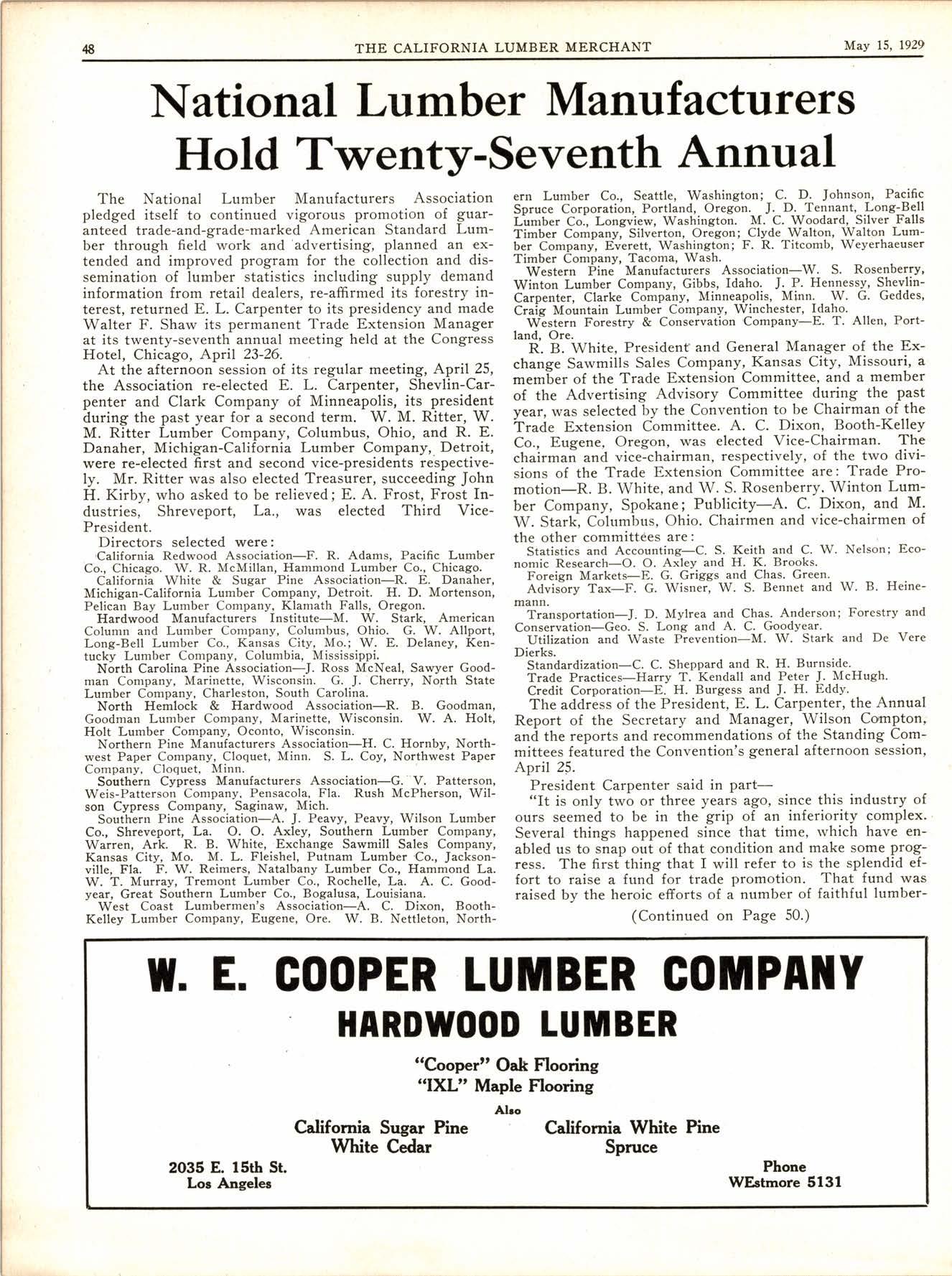
2 minute read
Random Editorial Ramblings
(Continued from Page 6.)
the retail lumber buyer. They have also urged that caution be observed about allowing a differential to retailers wrongfully representing themselves as wholesalers.
***
Benjamin Frankin once said, "To be thrown on your 7/own resodrces is to be cast into the very lap of fortune; i for our energies then undergo a develop*"ri and display i an energy of which they were previously unsusceptible." . I've always felt genuinely sorry for lots of good men I know, some of whom have made splendid successes of the affairs made and handed to them, but who have never been thrown on their own resources, never knori'n the incomparable training of havi4g to fight for their daily bread with their own head and hands, and who will probably never have a chance to discover whether or not they could make a living if thrown out on the world with no pull and empty pockets.
,F*t<
M. B. Nelson, President of the Long-Bell Lumber Co., says: "Pay labor the highest possible wage ; prosperity is intimately related to a generous wage scale." An eloquent spokesman, for General Motors goes much further than that. fle says: "When we want to cut costs, we raise wages. By so doing we increase efEciency and output, and achieve the desired cost reduction." There's a big thought there. Give it a minute, Mr. Lumberman, and see if it isn't. The auto industry has learned that only by paying a high wage scale, and by so doing forcing other industries to do the sarne, can it keep up the high tide o.f prosperity for ALL our peo-
M. J.'McKENNA VISITS BAY DISTRICT
M. J. McKenna, who for many years was associated with the Moore Mill & T, umber Co., Bandon, Ore., and who is now president of the McKenna Lumber Co., Marshfield, Ore., was a recent visitor to San Francisco, where he was a caller at the offices of the Trower Lumber Co. The McKenna Lumber Co. has leased the East Side mill of the Coos Bay Lumber Co., and will start up on June 10, cutting spruce exclusively. The capacity of the mill is l0O,00O feet a day.
ple that is necessary to consume their great production. Cut wages in this country, and millions of auto prospects are so no longer. See? ***
Get this ! One single mail order house in the United States is selling an average of one thousand homes per month, and is planning to greatly increase its business. ONE THOUSAND HOMES PER MONTH BY A SINGLE CONCERN. And we'll gambte long odds that every one of those thousand homes is sold in some commr:nity WHERE THE RETAIL LUMBER DEALER SAYS THAT BUSINESS IS SLOW.
The new forestry law of Oregon deserves the thought and attention of the entire forestry world. How to frame a forestry law that will enable and induce private owners to regrow forests without putting a burden upon them greater than they can bear, is the problem that every commonwealth with much cut-over land has been trying to solve. Oregon has created a law that seems to thrust far in the right direction. Lands upon which forests are to be grown by private owners are specifically designated as "foreet lands". They pay 5 cents per acre per year while the trees are growing. No more. And when the trees are harvested they are taxed l2l per cent on gross valuation. It looks as though Oregon has dug up a big thought that will make private owners keep their cut-over lands, and re-grow their forests.
Karl Kellogg Los Angeles Visitor
Karl Kellogg of the Ship Lumber Company, Tacoma, Washington, was a recent Los Angeles visitor. Although Mr. Kellogg was primarily here on a pleasure trip, he ittended to several business deals during his stay.
L. E. KUNKLER BACK FROM SOUTHERN TRIP
L. E. Kunkler, owner of the Pacific National Lumber Company, Los Angeles, has returned from a month's business trip visiting the various hardwood mills in the Southern States.

![W. E. GOOPER LUMBER GOMPA]IY](https://assets.isu.pub/document-structure/230727164648-c5d07986e87d8f4e635f177781e3edb8/v1/8c624346c45b55bb35ae14b5cc70caac.jpeg)








